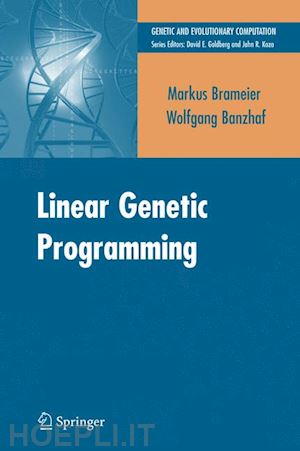

Questo prodotto usufruisce delle SPEDIZIONI GRATIS
selezionando l'opzione Corriere Veloce in fase di ordine.
Pagabile anche con Carta della cultura giovani e del merito, 18App Bonus Cultura e Carta del Docente
Linear Genetic Programming presents a variant of genetic programming (GP) that evolves imperative computer programs as linear sequences of instructions, in contrast to the more traditional functional expressions or syntax trees. Primary characteristics of linear program structure are exploited to achieve acceleration of both execution time and evolutionary progress. Online analysis and optimization of program code lead to more efficient techniques and contribute to a better understanding of the method and its parameters. In particular, the reduction of structural variation step size and non-effective variations play a key role in finding higher quality and less complex solutions. Typical GP phenomena, such as non-effective code, neutral variations, and code growth are investigated from the perspective of linear GP.
This book serves as a reference for researchers; it also contains sufficient introductory material for students and those who are new to the field.
Markus Brameier received a PhD degree in Computer Science from the Department of Computer Science at University of Dortmund, Germany,in 2004. From 2003 to 2004 he was a postdoctoral fellow at the Stockholm Bioinformatics Center (SBC), a collaboration between Stockholm University, the Royal Institute of Technology, and Karolinska Institute, in Sweden. Currently he is Assistant Professor at the Bioinformatics Research Center (BiRC) of the University of Aarhus in Denmark. His primary research interests are in bioinformatics and genetic programming.
Wolfgang Banzhaf is a professor of Computer Science at the Department of Computer Science of Memorial University of Newfoundland, Canada, and head of the department since 2003. Prior to that, he served for 10 years as Associate Professor for Applied Computer Science in the Department of Computer Science at University of Dortmund, Germany. From 1989 to 1993 he was a researcher with Mitsubishi Electric Corp.,first in MELCO’s Central Research Lab in Japan, then in the United States at Mitsubishi Electric Research Labs Inc., Cambridge, MA. Between 1985 and 1989 he was a postdoc in the Department of Physics, University of Stuttgart, Germany. He holds a PhD in Physics from the University of Karlruhe in Germany. His research interests are in the field of artificial evolution and self-organization studies. He has recently become more involved with bioinformatics.











Il sito utilizza cookie ed altri strumenti di tracciamento che raccolgono informazioni dal dispositivo dell’utente. Oltre ai cookie tecnici ed analitici aggregati, strettamente necessari per il funzionamento di questo sito web, previo consenso dell’utente possono essere installati cookie di profilazione e marketing e cookie dei social media. Cliccando su “Accetto tutti i cookie” saranno attivate tutte le categorie di cookie. Per accettare solo deterninate categorie di cookie, cliccare invece su “Impostazioni cookie”. Chiudendo il banner o continuando a navigare saranno installati solo cookie tecnici. Per maggiori dettagli, consultare la Cookie Policy.